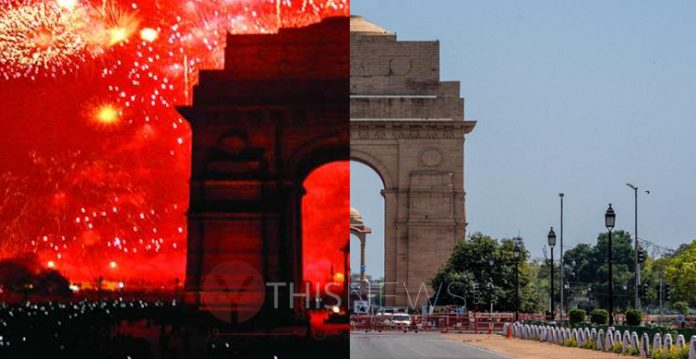New Delhi: As the Delhi-NCR faces the one-two punch of the surge in COVID-19 cases and pollution, around 79 percent of the residents demand a ban on the sale of regular crackers this Diwali, a survey uncovered on Thursday.
Each winter of the year, smoke or pollution in the air blends in with the fog – called smog- that covers the entire city with harmful air particles causing different pollution-related health dangers to people.
Medical specialists stress over the probability of smog that may impact the Covid to linger in the air for some additional time, demonstrating an up and coming danger of disease to increase in these cities.
‘LocalCircles’ directed a survey to comprehend the issue. The inquiry in the study attempted to understand the overall perception of individuals in Delhi, Noida, Gurugram, Ghaziabad, and Faridabad on their willingness to avoid firecrackers during the festival celebration.
To the inquiry that posed to residents, “Given that numerous areas of Delhi-NCR are as of now in hazardous air quality category or beyond, what should be done with the sale of crackers?”, the greater part of the respondents in Gurugram, Delhi and Faridabad decided in favor of a “total ban on the sale of all crackers this festive season”.
At a total level, 79 percent of residents of Delhi-NCR need a Ban on the sale of regular crackers this Diwali. 32 percent of them, in any case, support the sale of green crackers. 47 percent of citizens need a total prohibition on the sale of all crackers. 20% need the sale of all crackers to be allowed while 1 percent did not have an opinion.
The individual information of these five cities suggests that 64 percent of 1,247 residents in Gurugram, 51 percent of 5,062 residents in Delhi, and 50% of 984 in Faridabad, 25 percent of 1,416 in Noida, and 22 percent of 1,496 in Ghaziabad decided in favor of “complete prohibition on the sale of firecrackers”.
62 percent of respondents in Noida decided in favor of “prohibition on the sale of regular crackers or only green crackers may be permitted to sell.” 26 percent of respondents in Delhi, 27 percent in Gurugram, 20% in Faridabad, and 36 percent in Ghaziabad repeated on similar lines.
In general, it appears to be that an increasing number of citizens of Delhi-NCR are coming to the acknowledgment that they can have little impact on the stubble burning or vehicular pollution, however, cracker burning is something they can restrain from and most are happy to do it.
Another inquiry was posed to see how the ambitious plan that got the Supreme Court’s nod in 2016 to handle air pollution is being implemented across Delhi, Gurugram, Noida, Faridabad, and Ghaziabad.
The plan, GRAP or “Graded Response Action Plan” includes organizations -municipal corporations, traffic police, pollution control committee, transport department, police department, metro corporation, public works department, power plants — to undertake specific measures in their authority to control the amount of pollution released in the city’s air. It is a set of rules for state agencies to follow when the air quality index goes from “Moderate to Poor”, “Very Poor”, “Severe” to “Severe +” categories.
The following inquiry posed to Delhi-NCR residents to check whether agencies are in action to stop dust pollution at construction and demolition locations and RMC plants, stop the burning of trash in landfills and different spots, mechanized periodic sweeping and water sprinkling on traffic streets, boycott the use of diesel generators.
Surprisingly, just 20% to 25 percent of residents in these five cities said all the previously mentioned GRAP rules are being followed in their particular regions. Notably, 67 percent of 1,496 respondents in Ghaziabad answered “none of the four previously mentioned GRAP measures are being followed in their areas.
Additionally, 40% of 1,010 residents in Faridabad, 37 percent of 1,353 in Gurugram, 33 percent of 1,362 in Noida, and 29 percent of 5,205 in Delhi repeated on comparative lines. On the opposite 22 percent, 25 percent, 25 percent, 20%, and 22 percent of residents in Delhi, Gurugram, Noida, Faridabad, and Ghaziabad, separately, said “these GRAP measures are being followed” in their individual regions.
On October 15, ‘LocalCircles’ had issued the discoveries of its first air quality survey that declared that 65 percent of households in Delhi-NCR have at least one people or more who have begun encountering pollution-related ailments.
The survey likewise brought up that lone 22 percent of residents in the area believe that the Central and State Governments are working at diminishing pollution over the last year.
This most recent LocalCircles survey further casts light over the continued absence of apathy from organizations responsible to implement the GRAP rules in Delhi, Gurugram, Noida, Faridabad, and Ghaziabad and the requirement for authorities to get more active in guaranteeing that GRAP rules are being implemented.
With Delhi now encountering its third wave and everyday cases of COVID-19 approaching 5,000 in the city, the danger is inevitable and the medical specialists are themselves worried over the mix of COVID-19 and hazardous air.
Some have even made a prediction of 15,000 everyday cases in Delhi alone and an increase in death rate because of the mix of infection, polluted air, colder climate, and increase in social interactions because of celebrations.
The key here is for individuals to have self-control and for the state and the local government agencies to up GRAP enforcement on the ground and guarantee they just give licenses for the sale of green crackers this year.







